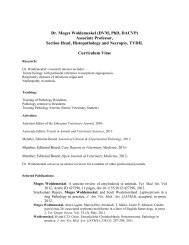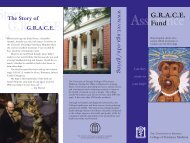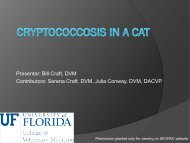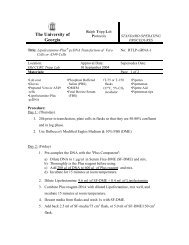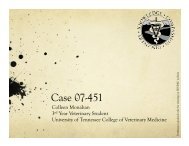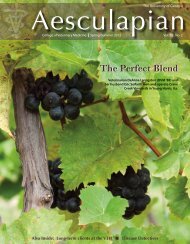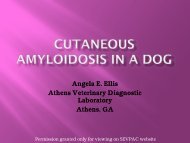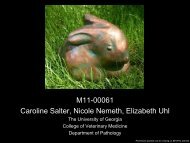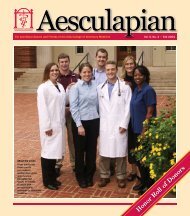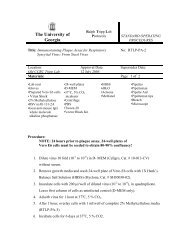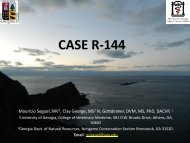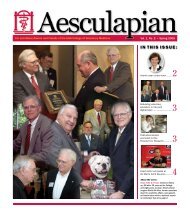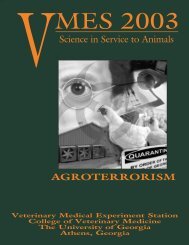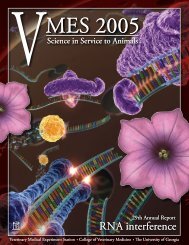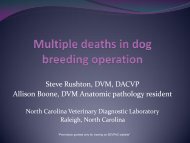Fall 2012/Winter 2013 Aesculapian Magazine - University of ...
Fall 2012/Winter 2013 Aesculapian Magazine - University of ...
Fall 2012/Winter 2013 Aesculapian Magazine - University of ...
You also want an ePaper? Increase the reach of your titles
YUMPU automatically turns print PDFs into web optimized ePapers that Google loves.
Alumni Pr<strong>of</strong>ile:<br />
Koren Moore Custer (MPH ’11, DVM ’12)<br />
Assistant State Veterinarian/Assistant Director:<br />
West Virginia Department <strong>of</strong> Agriculture: Animal Health Division<br />
What made you choose the UGA CVM for<br />
your educational goals At the time that I<br />
applied for veterinary school (2006-2007), there was<br />
a reciprocity agreement between the state <strong>of</strong> West<br />
Virginia and UGA CVM that (if accepted) allowed me<br />
to pay in-state tuition rather than out-<strong>of</strong>-state.<br />
What aspects <strong>of</strong> the program were most<br />
beneficial to you The large animal, infectious<br />
disease, and pathology courses at UGA CVM, in<br />
addition to the veterinary public health courses. At<br />
the UGA College <strong>of</strong> Public Health, the epidemiology<br />
courses and policy courses were beneficial.<br />
What kind <strong>of</strong> degree did you graduate<br />
with What made you want to pursue this<br />
particular degree I graduated with both a DVM<br />
and an MPH (conferred by the UGA College <strong>of</strong> Public<br />
Health). I’ve always been interested in both animal and<br />
human medicine, as well as infectious diseases. When<br />
I discovered through the freshman orientation course<br />
at UGA CVM that I could work in all <strong>of</strong> those fields<br />
with those degrees, I immediately knew that was the<br />
educational course that I wanted to pursue.<br />
What are you doing now I am currently<br />
employed through the West Virginia Department <strong>of</strong><br />
Agriculture as the assistant state veterinarian and the<br />
assistant director <strong>of</strong> the department’s Animal Health<br />
Division. I am involved with numerous activities,<br />
including: disease investigation and diagnosis, producer<br />
education and outreach, import/export, fair and festival<br />
animal inspections, necropsy, animal disease traceability,<br />
aquaculture, policy and law, and various administrative<br />
duties.<br />
How did your education here at the UGA<br />
CVM prepare you for your current position<br />
Of course, the core classes that are part <strong>of</strong> the UGA<br />
CVM curriculum were very important in my education.<br />
The elective courses were also essential, particularly<br />
those courses related to infectious disease and large<br />
animal-specific diseases. In addition to the classroom<br />
education that I received through the DVM program,<br />
the UGA CVM’s clinical coursework was immeasurably<br />
helpful in allowing me to understand veterinary<br />
medicine at the livestock production level. Being<br />
able to “talk shop” and communicate with a livestock<br />
producer is so important – I feel that the livestock<br />
production clinical rotations helped me to be able to<br />
do so.<br />
Was there a particular pr<strong>of</strong>essor here that<br />
made a big impact on your time here There<br />
are many pr<strong>of</strong>essors who impacted me during my time<br />
at UGA CVM. Drs. Mary Hondalus and Margie Lee<br />
helped guide me through the DVM/MPH program. Drs.<br />
David Reeves and Michael Overton helped me so much<br />
in understanding livestock production; my weeks in<br />
their clinical rotations were my favorites throughout<br />
all <strong>of</strong> veterinary school. Dr. Mark Ebell was a fantastic<br />
pr<strong>of</strong>essor at UGA CPH – he helped me to think about<br />
public health in a whole new light. And finally, Dr. Craig<br />
Greene was a wonderful teacher and mentor to me<br />
throughout all five years.<br />
What’s your favorite part <strong>of</strong> your current<br />
job Although I love everything about my job, there<br />
are two aspects that are my absolute favorites. The<br />
first is getting a call from a private practitioner with<br />
an oddball case, and visiting the farm to conduct an<br />
epidemiological investigation and collect and work<br />
up samples to try to figure out what’s going on. The<br />
second is producer education and outreach. I love<br />
talking with producers about their livestock and their<br />
farms and getting to know the community. I always<br />
learn something new and it’s wonderful to sometimes<br />
be able to teach them something in return.<br />
Photo provided by Koren Moore Custer.<br />
<strong>Aesculapian</strong> <strong>Fall</strong> <strong>2012</strong>/<strong>Winter</strong> <strong>2013</strong> 40



